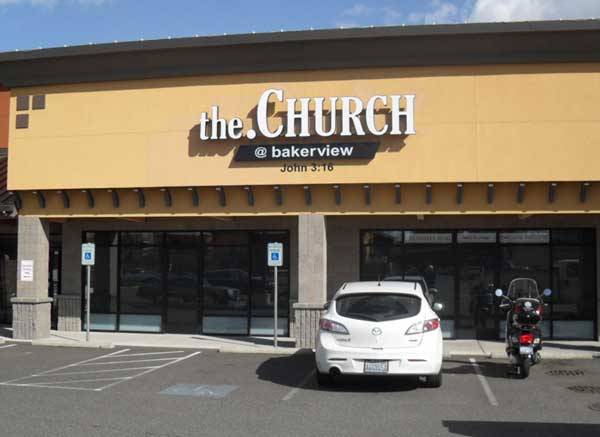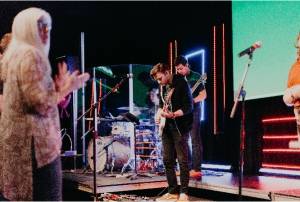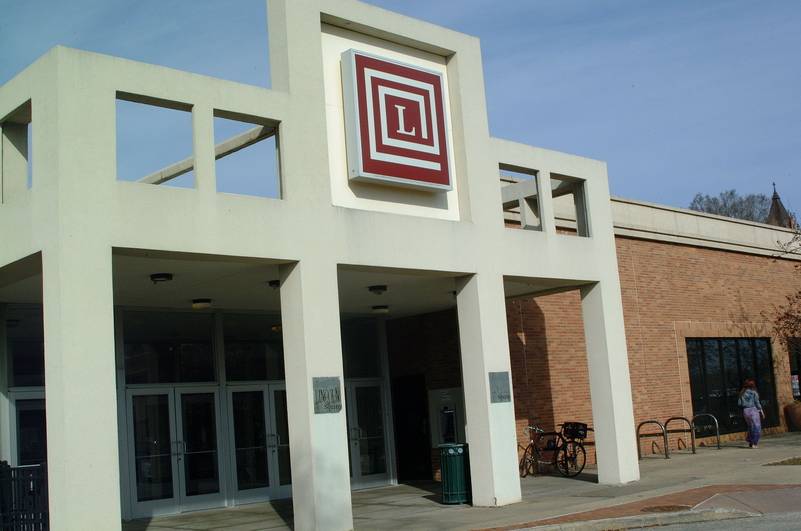The American shopping mall used to be quite the marvel. A menagerie of stores and services would congregate under one shared roof, creating a retail community that attracted shoppers by the thousands with the promise of all-day, one-stop shopping and all the commodities one could want to make such a venture as comfortable as possible.
With the explosive popularity of online shopping, brick-and-mortar stores have suffered, and perhaps none as visibly as those that have relied on the close proximity of other attractions and even their competitors to keep people coming and spending. So it is with Lincoln Square Mall in Urbana, with too many empty storefronts and a series of good ideas that just couldn’t quite make it work in the struggling center. Concerned citizens and business owners have been trying to find the right path to resuscitate the beleaguered mall for some time, and one model catching on across the country to varying success is putting it all in Jesus’s hands.
Well, not literally, but if you’ve walked through Lincoln Square on a Sunday morning, there’s a good chance you’ve heard the musical cry of worship spilling out of one of the two churches that have taken up residence there. In what’s become a common scene across the States and in the many malls therein, churches are renting spaces in struggling malls (and sometimes even outright buying the malls entirely) and making them their home.
At first blush, it’s a win-win. The churches get an affordable place to bring their congregants to observe their religion, and the malls get paying tenants. When it comes to keeping the lights on in a mall, something is better than nothing, and a church usually has pretty good going concern, representing reliable rent for at least the length of the first lease and likely beyond.

Above: Churches are making empty storefronts their home across the country.
It’s a little more complicated than that, though. Stores in a mall rely on each other for their health in subtle and not-so-subtle ways. The chocolatier wants passersby to spy their gourmet treats on their way out of the food court, the food court wants people to walk themselves hungry on their way from store to store, and the stores want people to come in with a mindset to spend money when they see something interesting in the window. Sunday-morning church service doesn’t check any of those boxes, but to be fair, they’re not unique in that regard.
 Left: Sunday mornings, the sounds of modern Christian worship echo from within the Lincoln Square Mall. Photo from the First Christian Church website.
Left: Sunday mornings, the sounds of modern Christian worship echo from within the Lincoln Square Mall. Photo from the First Christian Church website.
Law offices and investment firms don’t do much for their neighbors, either, with mostly by-appointment foot traffic that isn’t likely to transition into wandering through the other stores. It’s a complex problem. The stores in the mall need neighbors paying rent to keep the mall open so that everyone has a place to run their business, and the churches and offices provide that. But the stores that are selling things also need other stores that are selling things to drive mutual interest in a landscape that prefers the ease and accessibility of online shopping with two-day shipping.
And that’s the bigger problem: how do we get people to come to the mall as a destination every day and not just use it as an intersection with a roof? Malls that remain successful tend to be in high-density and affluent or touristy areas. That is, the mall needs to be an attraction. It needs to have unique, quality stores that can’t be imitated by big-box retailers or usurped by an online outlet. The foundation is there with a group of great stores with uncommon products and social offerings that mustn’t be understated, and Common Ground Co-op is a great draw. The Market At/In the Square is a fantastic event that brings people to the mall to see and sample things they might not have even known were hanging out in Urbana. It’s these sorts of things that will bring a mall back to life and not just keep its bills paid.
We crave the social engagement of the marketplace, whether we know it or not. As we delve deeper into the online, we delve deeper into further isolation, further loneliness, further anxiety and depression. We have a real need to re-engage with the real world, and the shopping mall, detestable obelisk of materialism and greed that it can be, is the modern forum that can reacquaint us with real people selling real things that can really benefit our local community. (The irony of a church’s somewhat appropriate and obviously contrarian place in this isn’t lost on me.)
This isn’t to say that a church — or a law office or an investment firm — is wrong for wanting an affordable place to help people in their own way. But in regard to the matter at hand — stoking the public interest and bringing them to the mall to see what’s going on — they just don’t quite get it done. A little bit of balance is all right, and a church or two isn’t going to ruin everything, but I hope the mall doesn’t keep trending that way, else it’ll end up a total ghost-town complex of churches and lawyers, a pretty bizarre bazaar.
Read more on Lincoln Square’s past and possible future here and here.








